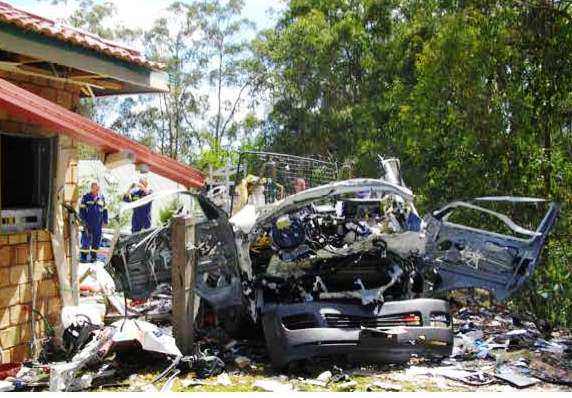
Petroleum and gas safety alert no. 50 | 20 December 2011 | Version 1
Risk of transporting gas cylinders in enclosed vehicles
What happened?
Two trades persons have tragically died in Melbourne and Darwin recently as the result of a gas explosion in their parked vehicles. In both cases a gas cylinder was being stored and transported inside the vehicles. Similar incidents have occurred in Queensland.
Tradespersons storing and transporting gas cylinders in enclosed vehicles must consider the possibility of an unexpected leakage into the vehicle where potential ignition sources are present.
Acetylene/LP gas/hydrocarbon refrigerant cylinders and propane/butane throwaway style canisters can store sufficient energy within them that, if released into the vehicle and ignited, will harm anyone in close proximity and potentially destroy the vehicle and nearby property.
Investigations have shown, in the majority of these incidents, the gas had leaked from the cylinder overnight through an open valve or via a worn hose or damaged piece of heating equipment left permanently connected to the cylinder. Typically ignition has occurred when the owner has proceeded to open the door either directly or indirectly via a remote button which has energised an interior light or activated a door locking solenoid.
Key issues
- Flammable gas even in small quantities can give rise to a devastating explosion in the confined spaces of a vehicle.
- Section 7 of the Qld Transport Operations (Road Use Management—Dangerous Goods) Regulation 2008, has special provisions for tools of trade and dangerous goods for private use in enclosed vehicles that specifies a maximum combined limit in cylinders of 50 litres water capacity.
- As of December 2007 it has been illegal to transport LPG cylinders inside enclosed vehicles (max of two) without placing a plug in their outlet (See DEEDI Safety Alert 33).
- The use of hydrocarbon refrigerants is regulated in Queensland. Do not repair or service air conditioning systems using hydrocarbon refrigerants unless authorised by this Department.
Recommendations
- Gas cylinders being transported in enclosed vehicles must be stored in a dedicated, labelled cylinder storage compartment. The compartment must be ventilated to outside atmosphere and sealed from the inside of their vehicle.
- Regardless in all circumstances, cylinders, whether inside or outside the vehicle, must be adequately restrained in an upright position, preferably in custom made racks or restraints to eliminate or minimise risk to the greater practicable extent.
- Remove pressure regulators and other attachments (torches) from the cylinder valve outlet when in storage.
- Turn off cylinder valves and plug valve outlets when stored (if possible).
- Never leave any gas cylinders in enclosed vehicles for long periods. Remove and place them in a cool, dry, well ventilated secure place.
Investigations are ongoing and further information may be published as it becomes available. The information in this publication is what is known at the time of writing.
We issue Safety Notices to draw attention to the occurrence of a serious incident, raise awareness of risks, and prompt assessment of your existing controls.
Contact: gassafe@dnrm.qld.gov.au
Issued by Queensland Department of Employment, Economic Development and Innovation
Find more safety notices
Search the hazards database

